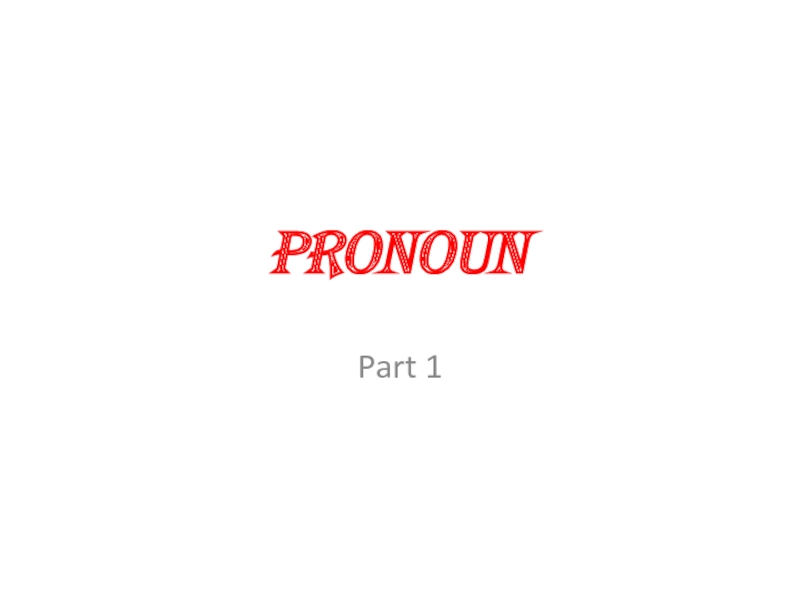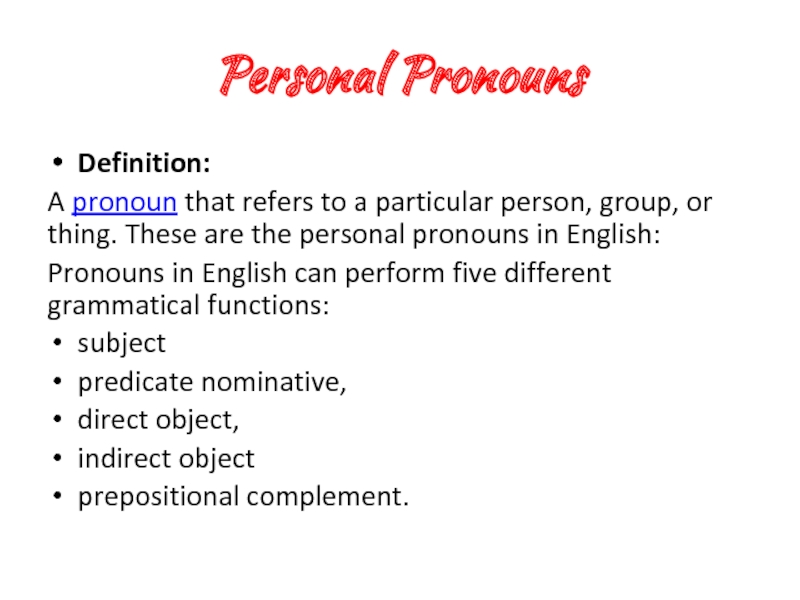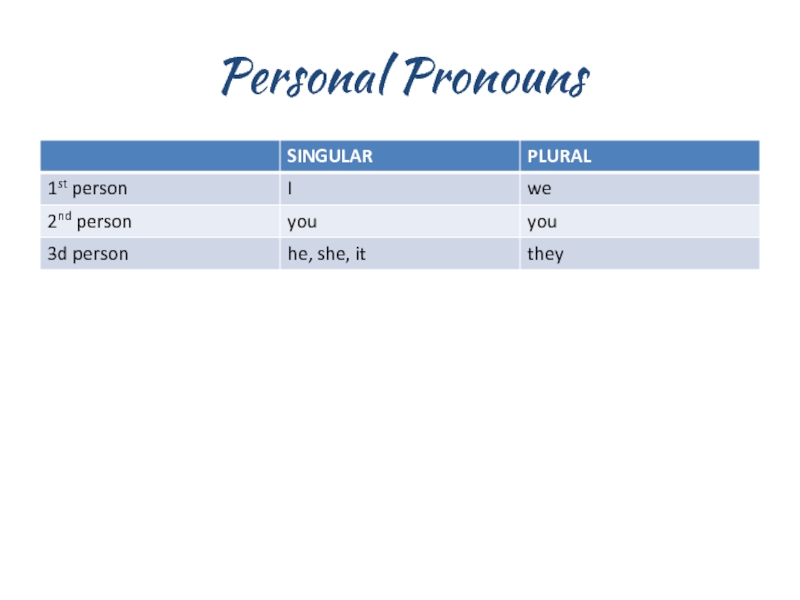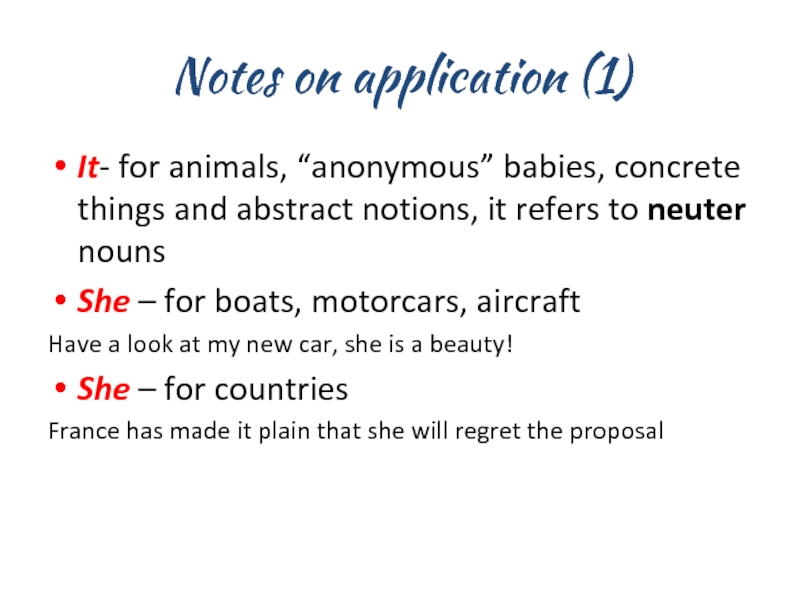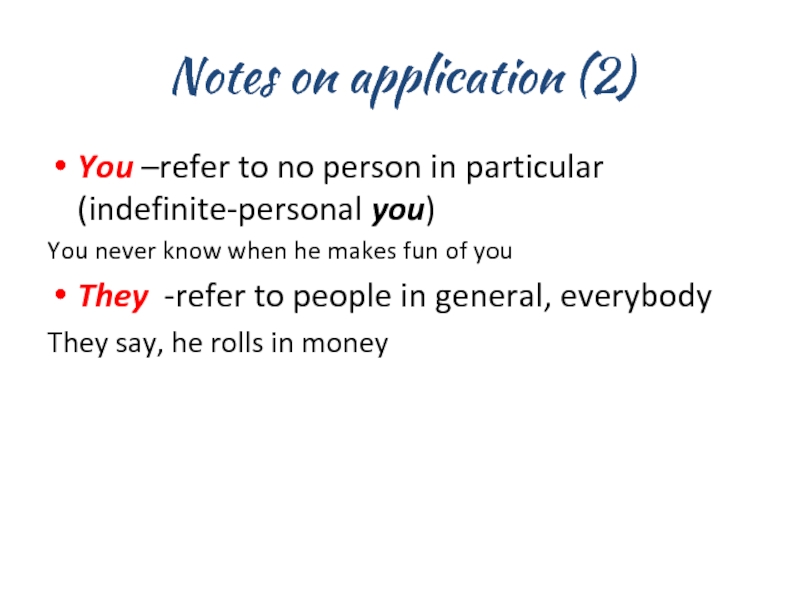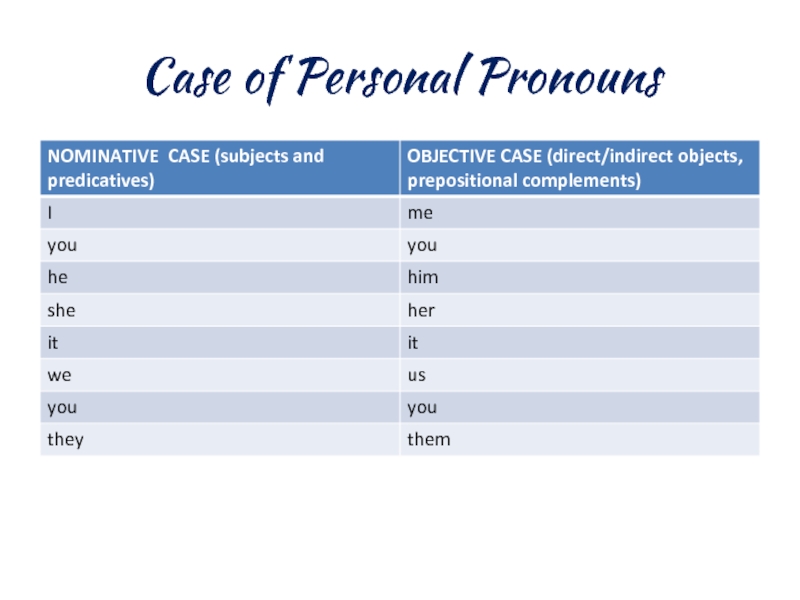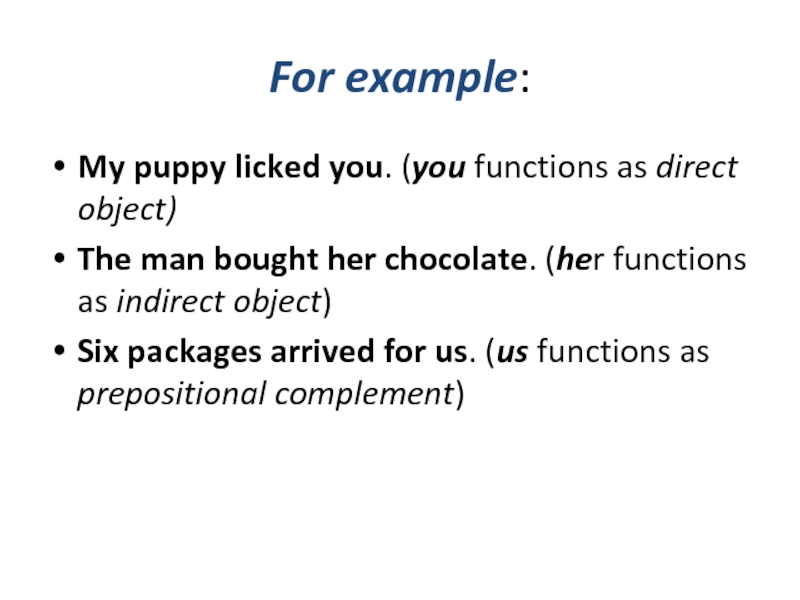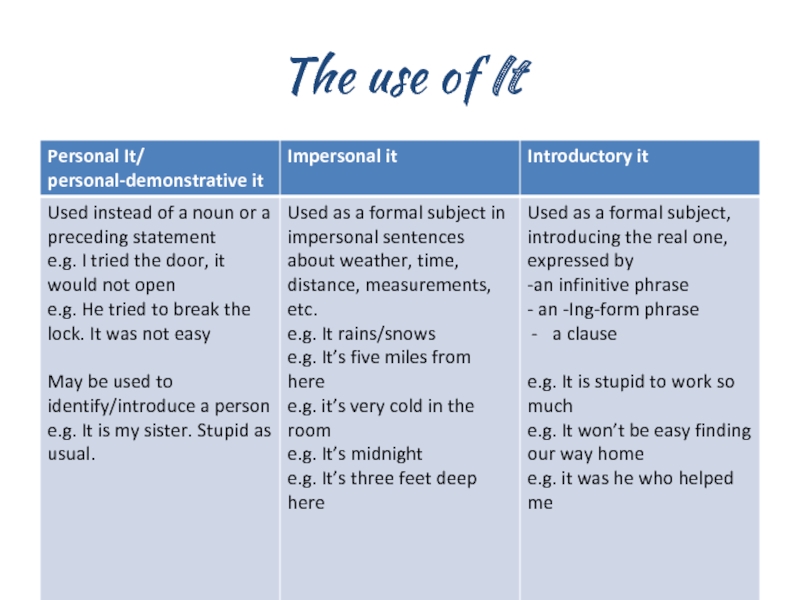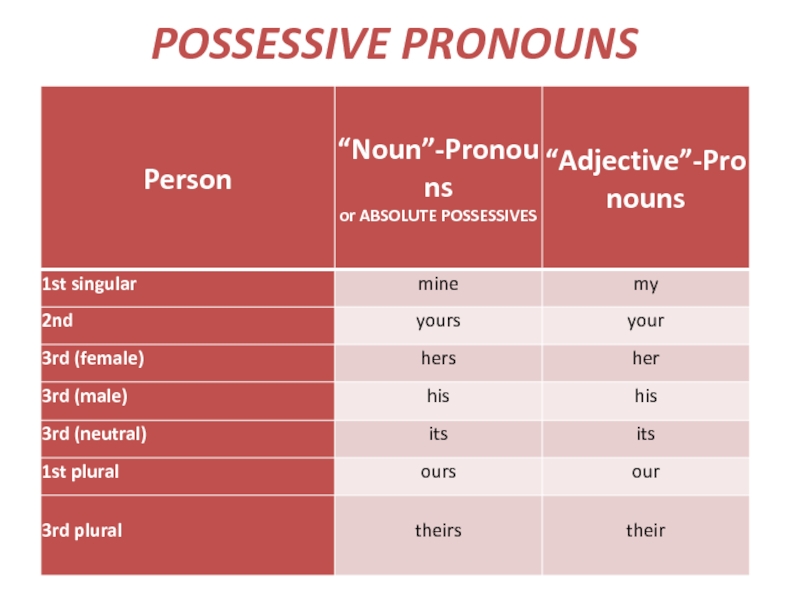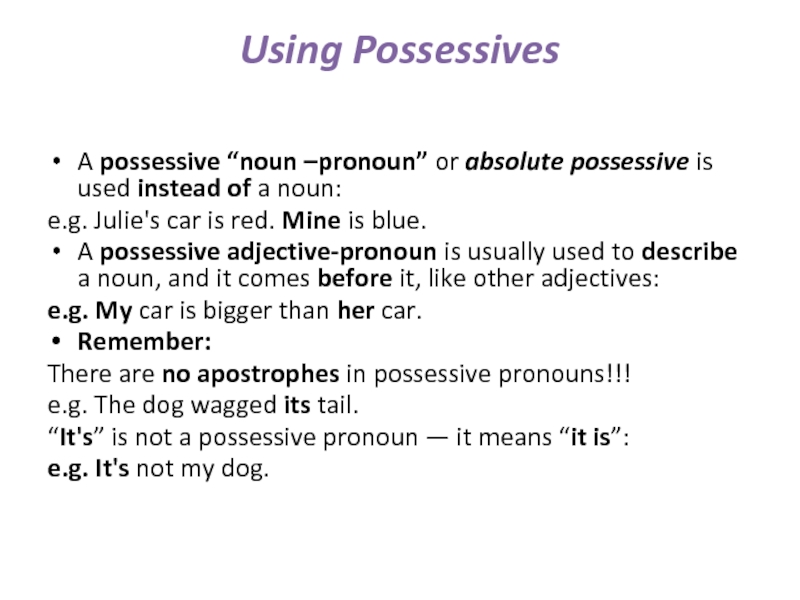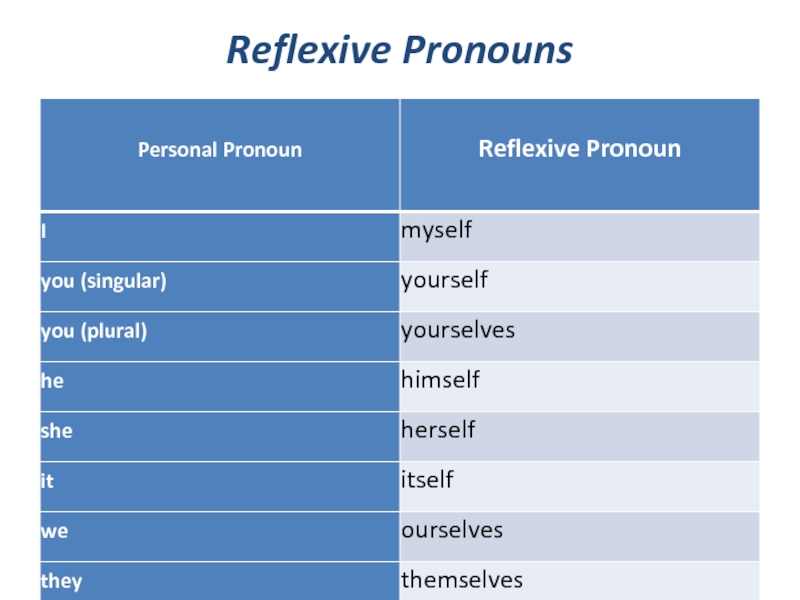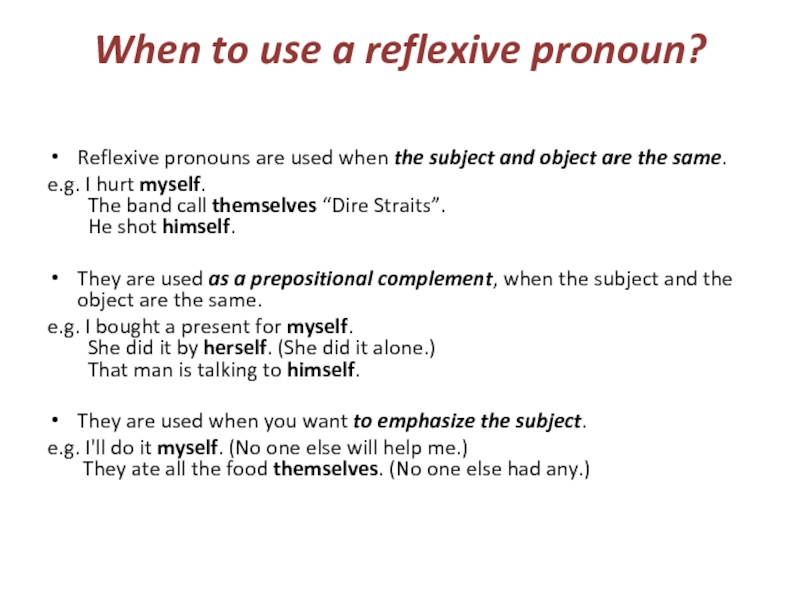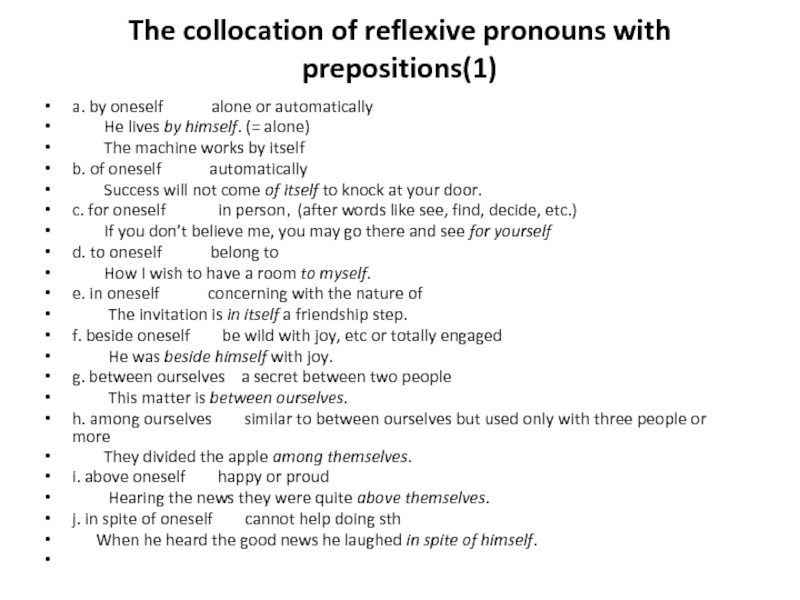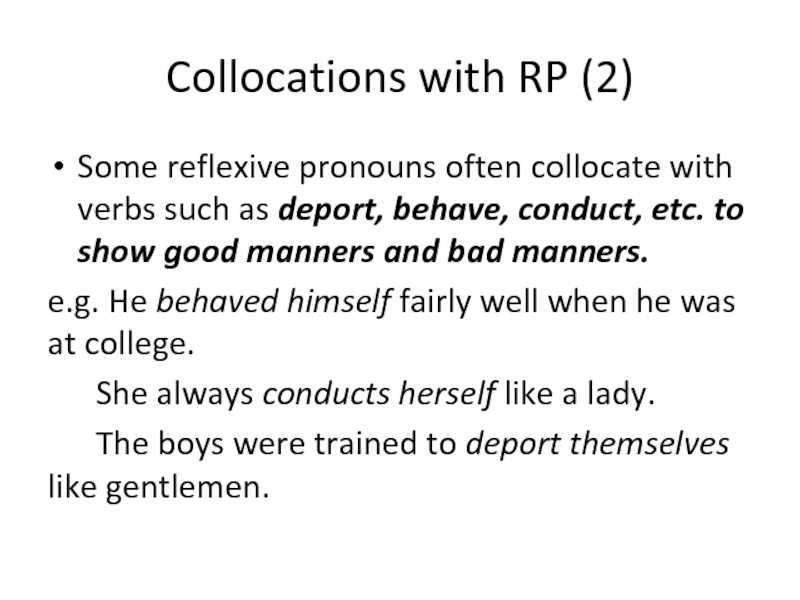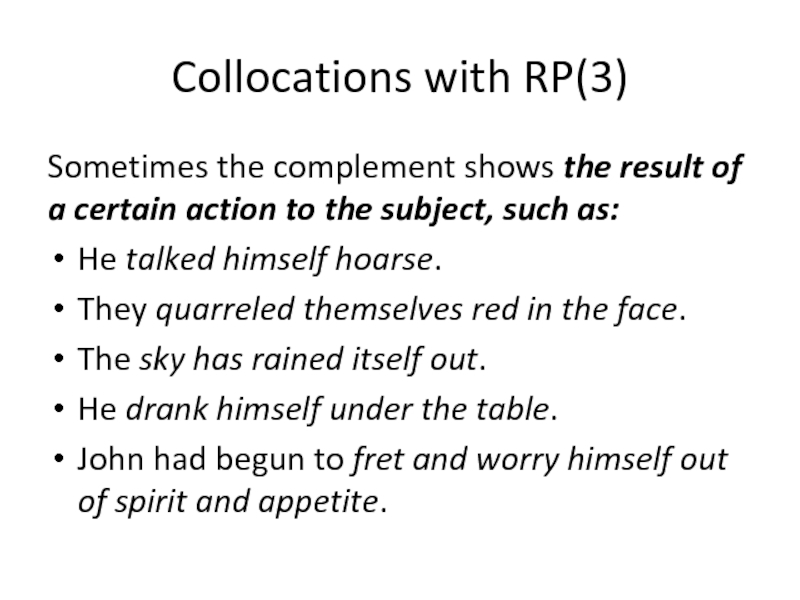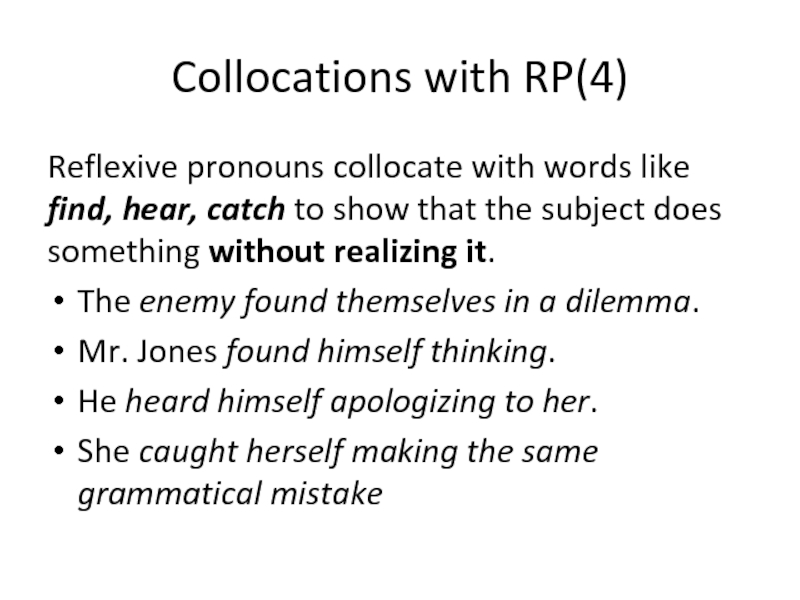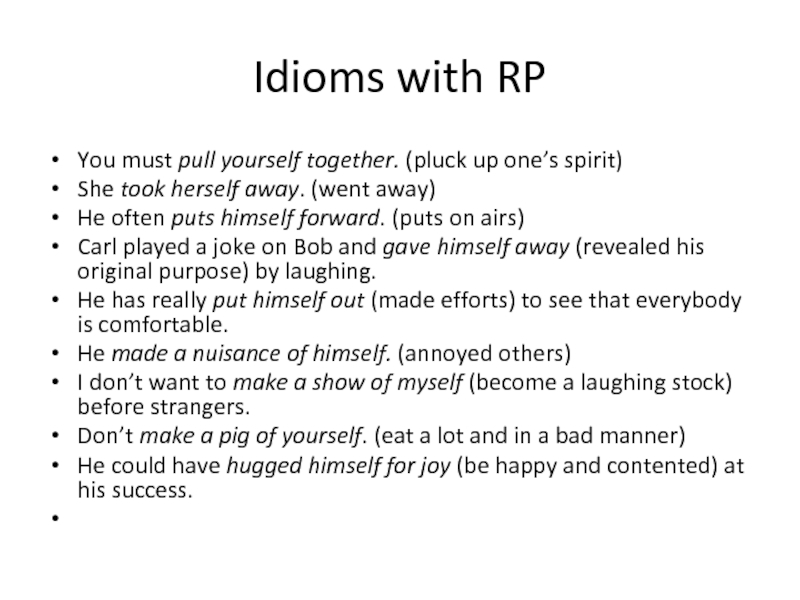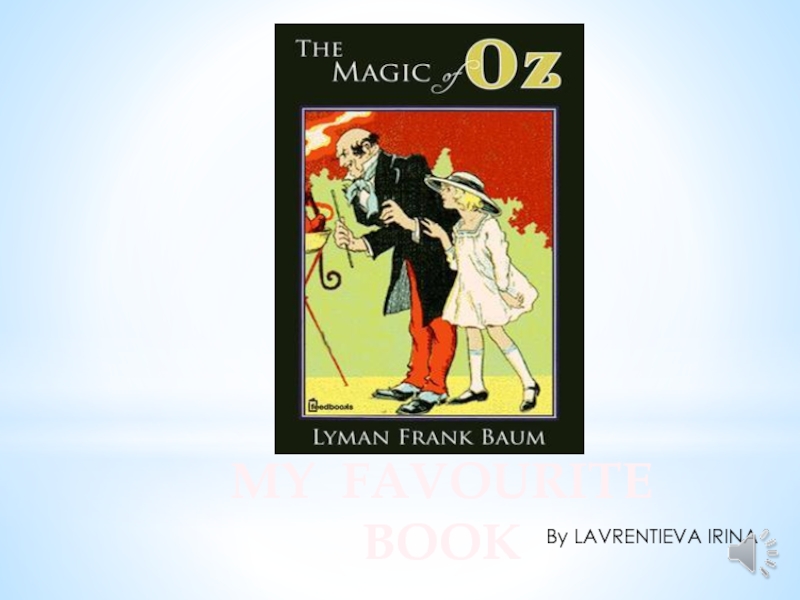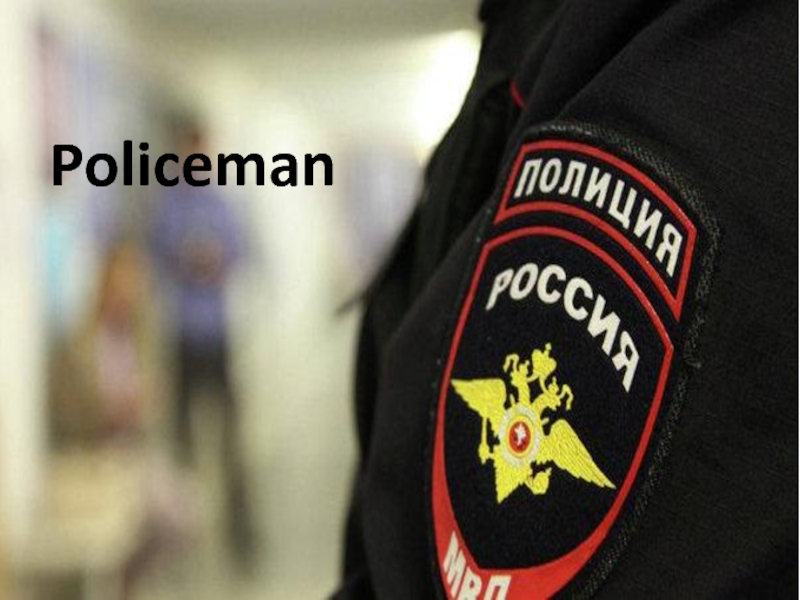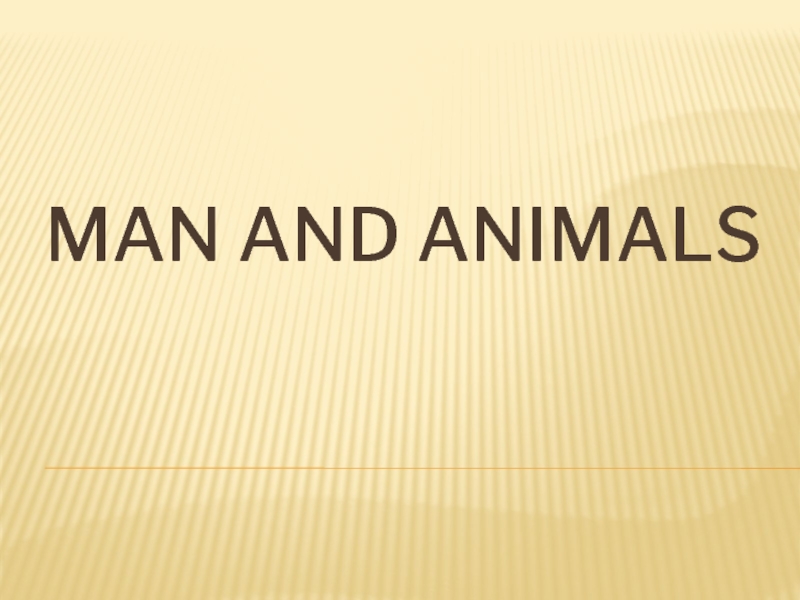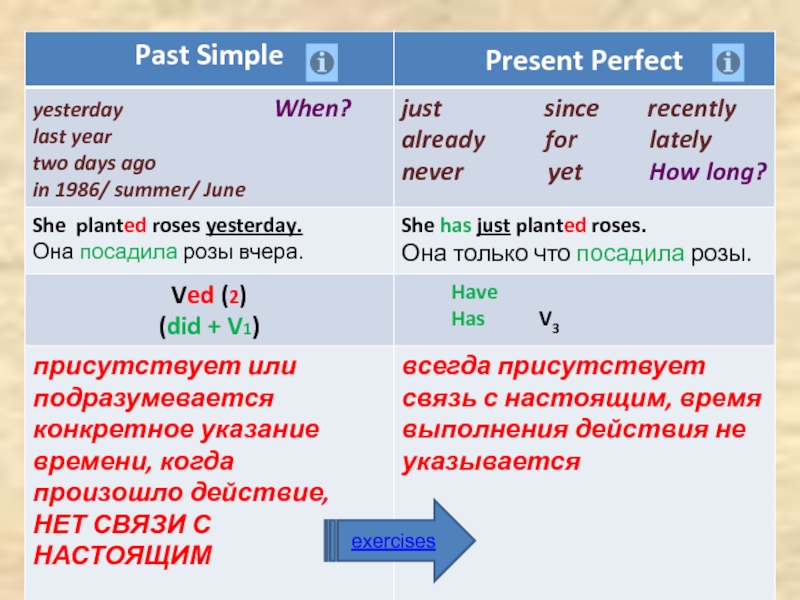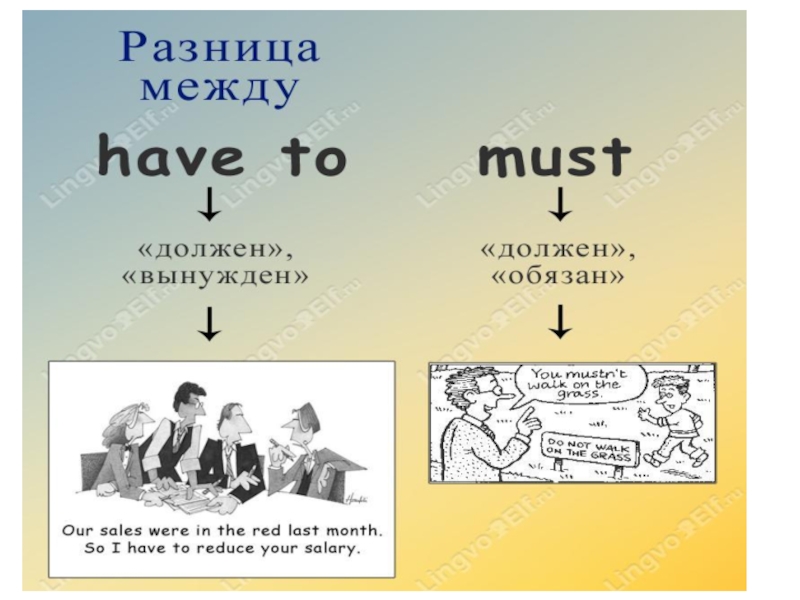- Главная
- Разное
- Дизайн
- Бизнес и предпринимательство
- Аналитика
- Образование
- Развлечения
- Красота и здоровье
- Финансы
- Государство
- Путешествия
- Спорт
- Недвижимость
- Армия
- Графика
- Культурология
- Еда и кулинария
- Лингвистика
- Английский язык
- Астрономия
- Алгебра
- Биология
- География
- Детские презентации
- Информатика
- История
- Литература
- Маркетинг
- Математика
- Медицина
- Менеджмент
- Музыка
- МХК
- Немецкий язык
- ОБЖ
- Обществознание
- Окружающий мир
- Педагогика
- Русский язык
- Технология
- Физика
- Философия
- Химия
- Шаблоны, картинки для презентаций
- Экология
- Экономика
- Юриспруденция
Pronoun. Personal Pronouns презентация
Содержание
- 1. Pronoun. Personal Pronouns
- 2. Personal Pronouns Definition: A pronoun that
- 3. Personal Pronouns
- 4. Notes on application (1) It- for animals,
- 5. Notes on application (2) You –refer to
- 6. Case of Personal Pronouns
- 7. For example: My puppy licked you. (you
- 8. The use of It
- 9. POSSESSIVE PRONOUNS
- 10. Using Possessives A possessive “noun –pronoun”
- 11. Reflexive Pronouns
- 12. When to use a reflexive pronoun?
- 13. The collocation of reflexive pronouns with prepositions(1)
- 14. Collocations with RP (2) Some reflexive pronouns
- 15. Collocations with RP(3) Sometimes the complement shows
- 16. Collocations with RP(4) Reflexive pronouns collocate with
- 17. Idioms with RP You must pull yourself
Слайд 2Personal Pronouns
Definition:
A pronoun that refers to a particular person, group,
or thing. These are the personal pronouns in English:
Pronouns in English can perform five different grammatical functions:
subject
predicate nominative,
direct object,
indirect object
prepositional complement.
Pronouns in English can perform five different grammatical functions:
subject
predicate nominative,
direct object,
indirect object
prepositional complement.
Слайд 4Notes on application (1)
It- for animals, “anonymous” babies, concrete things and
abstract notions, it refers to neuter nouns
She – for boats, motorcars, aircraft
Have a look at my new car, she is a beauty!
She – for countries
France has made it plain that she will regret the proposal
She – for boats, motorcars, aircraft
Have a look at my new car, she is a beauty!
She – for countries
France has made it plain that she will regret the proposal
Слайд 5Notes on application (2)
You –refer to no person in particular (indefinite-personal
you)
You never know when he makes fun of you
They -refer to people in general, everybody
They say, he rolls in money
You never know when he makes fun of you
They -refer to people in general, everybody
They say, he rolls in money
Слайд 7For example:
My puppy licked you. (you functions as direct object)
The man
bought her chocolate. (her functions as indirect object)
Six packages arrived for us. (us functions as prepositional complement)
Six packages arrived for us. (us functions as prepositional complement)
Слайд 10Using Possessives
A possessive “noun –pronoun” or absolute possessive is used instead
of a noun:
e.g. Julie's car is red. Mine is blue.
A possessive adjective-pronoun is usually used to describe a noun, and it comes before it, like other adjectives:
e.g. My car is bigger than her car.
Remember:
There are no apostrophes in possessive pronouns!!!
e.g. The dog wagged its tail.
“It's” is not a possessive pronoun — it means “it is”:
e.g. It's not my dog.
e.g. Julie's car is red. Mine is blue.
A possessive adjective-pronoun is usually used to describe a noun, and it comes before it, like other adjectives:
e.g. My car is bigger than her car.
Remember:
There are no apostrophes in possessive pronouns!!!
e.g. The dog wagged its tail.
“It's” is not a possessive pronoun — it means “it is”:
e.g. It's not my dog.
Слайд 12When to use a reflexive pronoun?
Reflexive pronouns are used when the
subject and object are the same.
e.g. I hurt myself. The band call themselves “Dire Straits”. He shot himself.
They are used as a prepositional complement, when the subject and the object are the same.
e.g. I bought a present for myself. She did it by herself. (She did it alone.) That man is talking to himself.
They are used when you want to emphasize the subject.
e.g. I'll do it myself. (No one else will help me.) They ate all the food themselves. (No one else had any.)
e.g. I hurt myself. The band call themselves “Dire Straits”. He shot himself.
They are used as a prepositional complement, when the subject and the object are the same.
e.g. I bought a present for myself. She did it by herself. (She did it alone.) That man is talking to himself.
They are used when you want to emphasize the subject.
e.g. I'll do it myself. (No one else will help me.) They ate all the food themselves. (No one else had any.)
Слайд 13The collocation of reflexive pronouns with prepositions(1)
a. by oneself
alone or automatically
He lives by himself. (= alone)
The machine works by itself
b. of oneself automatically
Success will not come of itself to knock at your door.
c. for oneself in person,(after words like see, find, decide, etc.)
If you don’t believe me, you may go there and see for yourself
d. to oneself belong to
How I wish to have a room to myself.
e. in oneself concerning with the nature of
The invitation is in itself a friendship step.
f. beside oneself be wild with joy, etc or totally engaged
He was beside himself with joy.
g. between ourselves a secret between two people
This matter is between ourselves.
h. among ourselves similar to between ourselves but used only with three people or more
They divided the apple among themselves.
i. above oneself happy or proud
Hearing the news they were quite above themselves.
j. in spite of oneself cannot help doing sth
When he heard the good news he laughed in spite of himself.
He lives by himself. (= alone)
The machine works by itself
b. of oneself automatically
Success will not come of itself to knock at your door.
c. for oneself in person,(after words like see, find, decide, etc.)
If you don’t believe me, you may go there and see for yourself
d. to oneself belong to
How I wish to have a room to myself.
e. in oneself concerning with the nature of
The invitation is in itself a friendship step.
f. beside oneself be wild with joy, etc or totally engaged
He was beside himself with joy.
g. between ourselves a secret between two people
This matter is between ourselves.
h. among ourselves similar to between ourselves but used only with three people or more
They divided the apple among themselves.
i. above oneself happy or proud
Hearing the news they were quite above themselves.
j. in spite of oneself cannot help doing sth
When he heard the good news he laughed in spite of himself.
Слайд 14Collocations with RP (2)
Some reflexive pronouns often collocate with verbs such
as deport, behave, conduct, etc. to show good manners and bad manners.
e.g. He behaved himself fairly well when he was at college.
She always conducts herself like a lady.
The boys were trained to deport themselves like gentlemen.
e.g. He behaved himself fairly well when he was at college.
She always conducts herself like a lady.
The boys were trained to deport themselves like gentlemen.
Слайд 15Collocations with RP(3)
Sometimes the complement shows the result of a certain
action to the subject, such as:
He talked himself hoarse.
They quarreled themselves red in the face.
The sky has rained itself out.
He drank himself under the table.
John had begun to fret and worry himself out of spirit and appetite.
He talked himself hoarse.
They quarreled themselves red in the face.
The sky has rained itself out.
He drank himself under the table.
John had begun to fret and worry himself out of spirit and appetite.
Слайд 16Collocations with RP(4)
Reflexive pronouns collocate with words like find, hear, catch
to show that the subject does something without realizing it.
The enemy found themselves in a dilemma.
Mr. Jones found himself thinking.
He heard himself apologizing to her.
She caught herself making the same grammatical mistake
The enemy found themselves in a dilemma.
Mr. Jones found himself thinking.
He heard himself apologizing to her.
She caught herself making the same grammatical mistake
Слайд 17Idioms with RP
You must pull yourself together. (pluck up one’s spirit)
She
took herself away. (went away)
He often puts himself forward. (puts on airs)
Carl played a joke on Bob and gave himself away (revealed his original purpose) by laughing.
He has really put himself out (made efforts) to see that everybody is comfortable.
He made a nuisance of himself. (annoyed others)
I don’t want to make a show of myself (become a laughing stock) before strangers.
Don’t make a pig of yourself. (eat a lot and in a bad manner)
He could have hugged himself for joy (be happy and contented) at his success.
He often puts himself forward. (puts on airs)
Carl played a joke on Bob and gave himself away (revealed his original purpose) by laughing.
He has really put himself out (made efforts) to see that everybody is comfortable.
He made a nuisance of himself. (annoyed others)
I don’t want to make a show of myself (become a laughing stock) before strangers.
Don’t make a pig of yourself. (eat a lot and in a bad manner)
He could have hugged himself for joy (be happy and contented) at his success.
